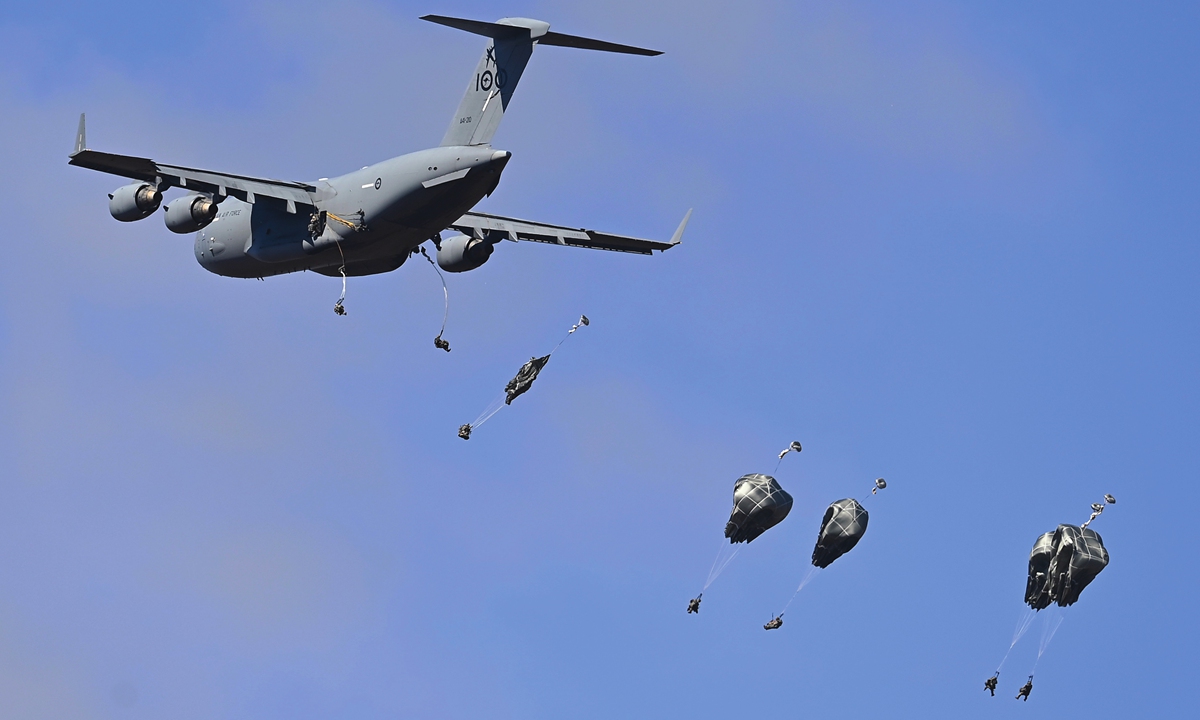
Photo: VCG
Editor's Note:
In a recent article, former Australia diplomat John Lander (
Lander) argued that "The United States is not preparing to go to war against China. The United States is preparing Australia to go to war against China." Under what circumstances will Australia become a proxy of the US? What lessons could Australia learn from Ukraine? Global Times (
GT) reporter Wang Wenwen talked to Lander over these issues. Lander worked in 1971-72 in the Department of Foreign Affairs upon Australia's recognition of the People's Republic of China. He was director of the China section of the department on three separate occasions in the years following his posting to Beijing. He was personally responsible for negotiating the establishment of consular relations between the two countries. He also commented on the China policy adopted by the Albanese government.
GT: In your latest article, you said that "the US is not preparing to go to war against China, but it is preparing Australia to go to war against China." Under what circumstances will Australia become a proxy of the US?
Lander: We are already a proxy of the US. The United States has now established an extremely large military footprint in Australia. It now describes Australia as the most important base for the projection of US power in the Indo-Pacific. The United States has not abandoned its determination to maintain its supremacy in the world, in particular, its control of world banking and finance. The so-called threat from China, which is frequently described in military terms, is not, in fact, a military threat by China at all. It is a challenge more than a threat by China to the US domination of the international financial system.
In its determination to preserve its hegemonic position, the United States has made it very clear that it will use all means, including military means, to sustain its position as No.1. It also has made it very clear in many statements that in regard to the principal adversaries, as it calls Russia and China, both of whom are nuclear armed states, it will not engage directly in war with either. It will conduct its wars against Russia and against China by proxy.
The US has a fallback position of developing Australia as an alternative proxy adversary against China. We went along with that. Under the previous government, we were saying if Taiwan were to be attacked, then Australia would have to come to the defense of Taiwan, and we would be involved. So we had already accepted the United States' plan to involve China in a war, specifically conducted in such a manner as to enable the United States to continually pretend that it itself is not actually engaged in such a war.
Many of the military personnel from US Defense Secretary Austin down through various admirals and generals have been talking about the necessity to prepare for war against China. But although it has been interpreted by most observers as being statements that the United States is preparing it to go to war itself directly against China, I do not believe it is the case. America's involvement would be under the proxy arrangement to support Australia in the conduct of the conflict. And I don't see anything that really would change my view of where we are headed.
GT: What lessons could Australia learn from Ukraine?
Lander: It is clearly demonstrated by the war in Ukraine that the United States is prepared to sacrifice a so-called ally in pursuit of its own interests. The obvious lesson is to not allow ourselves to be used as a proxy. Australia would gain absolutely nothing from engaging as a proxy for the United States in a war against China.
But at the moment, there is no one that I can see in our ruling elite, in the government, that appears to be willing to say no to the United States. There are plenty of reasons including historic ones. Most politicians in power in Australia are still afraid of the influence that America could exert in Australia to basically cause them to lose office. America is extremely skilled at conducting regime change operations all around the world. I think if Australia were to defy the United States, we would find ourselves in trouble in terms of potential destabilizing in Australia.

John Lander Photo: Courtesy of Lander
GT: How will the AUKUS agreement compromise Australian sovereignty?
Lander: It is indeed not the AUKUS agreement. There is no written document. There's no formal agreement. It is not a treaty. It is not even a pact. It has not been reviewed in any detail by either the parliament or the people and has never been voted on. It is a sort of gentlemen's agreement (if you could call them gentlemen) between the British prime minister, the American president, and the Australian prime minister. Simply, they gave a name to a process which has been going on under the auspices of the ANZUS treaty for many years.
The legal instrument by which Australia's sovereignty has been handed over to the United States is, in fact, the Force Posture Agreement of 2014, which makes it extremely explicit that any US assets, anything it develops as a base, anything that it equips as a base, any personnel or munitions or any other military assets, which it locates in such bases, are under the complete and unchallenged authority of the United States.
It makes it very clear that all of this militarization in the north of Australia is under United States control. And Australia has absolutely no say whatsoever in how, when or why such facilities would be used, which leads most reasonably sane and realistic observers are looking at the implications of the Force Posture Agreement to say Australia would inevitably be dragged in if the United States went to war against China.
Also under this vague veil of the AUKUS, it is now being declared that United States forces would be wholly interchangeable with Australian defense forces. We already have American military personnel in our defense policymaking and in the command positions within the Australian defense force. But interchangeable, I think, is a very important word, because it makes it clear that anything American in Australia can immediately be used as Australian. The militarization of northern Australia is, I believe, actually designed to make it possible to ensure that Australia will, in fact, be at war against China at some point in the not too distant future, whilst America can stand off on the sidelines and say they are not directly involved; they must help our ally by pouring in more and more weapons, materiel and ammunition, but still maintaining the pretence that they're not directly engaged in the actual war. I see this is the most likely scenario.
We have the alliance with the United States in order to feel secure. But it has long ceased to serve that purpose.
So Australia's greatest protection against us being involved in a war against China is, in fact, China itself. As long as China is able to continue showing the extreme forbearance that has shown to the military provocations by the United States (and indeed Australia) within China's coastal waters and over China's airspace, and refrains from reacting to that in the same manner that the United States reacted to a rather innocuous balloon that floated over the United States, war can be avoided. China could have used exactly the same language to justify its more extreme measures against surveillance aircraft flying over China than it has so far taken.
GT: How can Australia walk out of the paradox that Australia needs the US for its defense, but it only needs defending because of the US?
Lander: The United States has never regarded the ANZUS treaty as a guarantee that the United States would, under all circumstances, actively defend Australia. The ANZUS only provides for consultations between us and the United States as to the best means of assisting Australia in its defense. But it makes it very clear that Australia has to defend itself. Whereas Australian governments, almost without exception, have regarded the ANZUS alliance as a guarantee of Australia's security, which in a war, it would not be such guarantee. It's a kind of psychological security blanket which we have never really grown up to and let go of. We desperately cling to this security blanket and thereby create the opportunity for the United States to turn Australia into its forward military base in the Indo-Pacific.
It would be extraordinarily difficult for Australia to even step back slightly from the current implications of our alliance with the United States. I don't think the United States would allow us to walk away entirely. And I don't think any Australian government would have the political courage to rescind the Force Posture Agreement. It will take many years of active opposition by the Australian people to the direction that the government is going for the government to change direction.
There may very well be global developments, which are really obviate any necessity to do that in terms of the impending change to the global international financial order, the impact that will have on the United States dollar, the impact that will have on the United States economy and developments within the United States itself as a result of its own economic dysfunction. We just don't know what will come first.
Australia is caught in many paradoxes. Australia is still talking about having to go to war against China in order to protect our trade with China, which is an absurdity. We also have the irony that Australia can only afford to buy nuclear powered submarines from the United States so long as it continues to earn massive profits from China - the Australian budget depends it to very large extent on the income from our trade with China.
GT: How do you evaluate the China policy adopted by the Albanese administration?
Lander: The Albanese government is on the one hand endeavouring to improve diplomatic relations and trading relations, whilst on the other hand, it still goes along with the United States in building up a war capability against China, which is, likewise, basically a paradox.
China has consistently over the last almost 10 years, certainly over the last 5 years, in every single statement it has made about Australia or message that it has delivered to Australia, stated the wish to have a collaborative, productive and mutually beneficial relationship with Australia, which if Australia had any sense, it would reach for the same thing.
That does not mean that Australia and China should agree on everything. We have differences and some of those differences could not be ironed out. But we could take the same position as China of not allowing those differences to impede the development of collaboration in areas where we could see eye to eye.
Penny Wong, as foreign minister, I think, is trying very hard to reassert the role of diplomacy in bilateral relations, not only with China, but with most of the rest of the world. She has an extraordinarily difficult job, because the other political forces in Australia, particularly the forces within the so-called defense establishment, are always pushing her in the opposite direction.
It's going to take quite a lot of time and quite a lot of hard work to stabilize and then further develop the relationship in a positive direction. China is able to make a contribution. I believe that China can afford to be magnanimous and gradually remove some of the impediments to some of the Australian exports to China, which would go a long way toward constructing more goodwill in Australia toward China.





